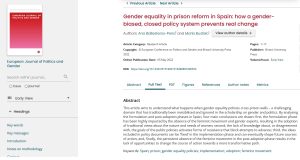Gender and Politics Readings (II)
This week we wish to recommend two readings from researchers of our Gender and Politics group. The first is the review on Ghufran Khir-Allah‘s book Framing Hijab in the European Mind (2021) link.springer.com/book/10.1007/9written by Oumaya Amghar Ait Moussa Framing Hijab in the European Mind: Press Discourse, Social Categorization and Stereotypes : IEMed
Excerpts:
(…) Ghufran Khir-Allah analiza en Framing Hijab in the European Mind el trato que se ha dado al hiyab en los medios de comunicación a través de tres acontecimientos centrales: a través de una comparativa de cómo los medios de comunicación británicos y españoles han tratado la prohibición francesa del hiyab en la escuela en 2004, la cobertura por parte de la prensa española y británica de la exclusión del hiyab y el debate sobre la visibilidad del velo en el ámbito público nacional (…).
(…) Las mujeres se enfrentan a muchas luchas, pero como afirma Ghufran Khir-Allah, para las mujeres musulmanas en Europa es una lucha de visibilidad, contra los estereotipos y de reivindicación del respeto a su identidad religiosa y de género. Porque, al fin y al cabo, de eso se trata, ¿no? De respeto, libertad, tolerancia e igualdad.(…)
The second reading we recommend is the article by Ana Ballesteros-Pena and María Bustelo (2022) Gender equality in prison reform in Spain: how a gender-biased, closed policy system prevents real change. European Journal of Politics and Gender. DOI:https://doi.org/10.1332/251510821X16490897406533
This article aims to understand what happens when gender equality policies cross prison walls – a challenging domain that has traditionally been invisibilised and ignored in the scholarship on gender and politics. By analysing the formulation and post-adoption phases in Spain, four main conclusions are drawn: first, the formulation phase has been highly impacted by the absence of the feminist movement and gender experts, resulting in the adoption of traditional views about the nature and needs of women; second, the lack of knowledge about, or disagreement with, the goals of the public policies activates forms of resistance that block attempts to advance; third, the ideas included in policy documents can be ‘fixed’ in the implementation phase and can eventually shape future courses of action; and, finally, the persistent absence of the feminist movement in the post-adoption phase results in the lack of opportunities to change the course of action towards a more transformative path.

